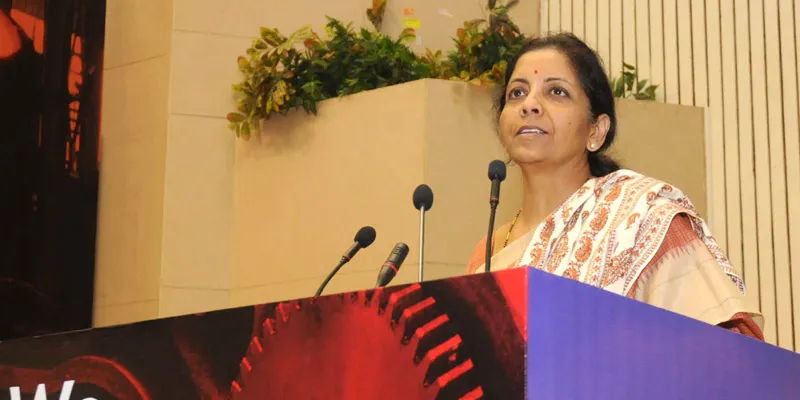Ready to step in but will not mother and smother startups: Nirmala Sitharaman
Addressing the unspoken fear that Indian governments would end up stifling startups in their enthusiasm to mother them, commerce minister Nirmala Sitharaman said her ministry did not want to get in the way but play the facilitator. She was speaking at the inaugural of the Start-up India States’ Conference organized by her ministry in New Delhi.

The minister and Secretary, Department of Industry Policy and Promotion (DIPP), Ramesh Abhishek spoke earnestly. Their tenor was positive and helpful and this was appreciated by the four young entrepreneurs who were called on stage to narrate their experiences and state their expectations of the government at the end of the morning session.
Abhishek said his ministry would strive to ensure that rules and regulations were not an impediment. His department would coordinate with other ministries on matters that required them to act.
Sitharaman was ‘glad a lot of things are moving and there is lot of churn.’ Since the startup action plan was launched in January, the ministry had received many suggestions about what should be done and what should not be. ‘This is welcome,’ she said. The startup hub set up in April had received 13,500 queries and most of them had been answered.
The minister listed out the measures taken to promote startup activity ─ no income tax for three of five years, exemption for ‘white’ industries from environmental laws, light coverage of labour laws, preference in government procurement, recognition of 278 incubators and a Rs 10,000 cr fund of funds.
DIPP had allowed 20 private organizations including Nasscom and iSpirit as incubators in a bid to reach out to more startups. Incubators have been told they cannot charge more than Rs 5,000 as fee for providing letters of recommendation.
Startups would be eligible for benefits with a DIPP certificate without being vetted by an inter-ministerial board. So far, DIPP has received 782 applications for tax benefits. Of these 180 had the required documents, 88 were eligible for most of the benefits but only one had managed to get approval of the inter-ministerial board.
But getting out of the way did not mean lack of oversight. Public money had to be spent transparently. Minimum government did not mean no governance.
Sitharaman said 4,400 technology startups had come up and India ranked third on this score after the United States and UK. The target was 12,000 over the next four years. She would meet startup founders on 28 July and for one month thereafter, she would hold six more meetings with incubators, angel investors, venture funds, private equity guys, industry associations and journalists covering the industry.
Five states ─ Gujarat, Telangana, Karnataka, Kerala and Rajasthan ─ made presentations, tediously listing out sops and facilities. What stood out was Gujarat’s Icreate, set up in partnership with the Indian Institute of Management, Ahmedabad. Its CEO said it was designed as ‘the place to be’ for entrepreneurs. The campus would be ready in a few months. It would be run by entrepreneurs who would provide a platform for prototyping, field trials, market access, fund raising, branding, marketing, the works....
Gujarat’s credentials in entrepreneurship development need no burnishing. In 1969 it had launched the ‘Technician Scheme’ to train engineers to become entrepreneurs. In 1970, came India’s first entrepreneurship development programme. And iNDEXTb or Industrial Extension Bureau set up in 1977 was a pioneering investor escort service. But Gujarat does not score high on the frills of life, which might be a put off for IT startups.
Telangana flaunted T-Hub in Hyderabad, a 70,000 sq ft complex where services are provided at highly discounted rates. It got filled up within a year, so a second one of 300,000 sq ft is being set up on prime land, which if auctioned, officials said, would have fetched the government about Rs 200 cr. The T-Hub has a structured process for mentoring by senior faculty from the Indian Institute of Information Technology, the Indian School of Business and National Academy of Legal Studies and Research. The government has kept an arm’s length distance from the hub; it is managed by a team of 12, of which only one is a government representative. They are catering to 220 startups in financial technology, robotics, agricultural technology, healthcare technology and education technology. Sector specific incubators for gaming and animation, hardware and defence and aerospace would be set up next.
Karnataka strutted its stuff with the air of been there done that. ‘It took the state a decade and a half to become a startup hub,’ the presenter said, suggesting that others could aspire to Bengaluru’s status but would not easily catch up.
Rajasthan said it did not shower money; angel investors could do that. Instead, it has four mentoring and hand-holding programmes.
The panel discussion before the end of the morning session had four discussants. Shashank ND, the founder and CEO of Practo, Ritesh Agarwal of OYO Rooms, Govind Kavaturi of Brand Metrics and Rohit Sehgal of mapmytalent.in. They said funding would follow if startups were based on an idea that addressed a felt need. The current constriction in fund flow should be an opportunity to focus on basics.







